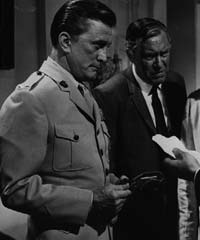
Kirk Douglas made his mark on American film history as an actor, director, and producer. In only two films did he combine all three of these roles: Scalawag in 1973 and Posse in 1975. But some of his most highly regarded roles as an actor came through working with exceptional directors who made the most of his fiercely memorable presence, whether playing a hero or a villain, or an intriguing mixture of the two. Film critic Bill Wine calls Douglas’s face “a movie icon – eyes blazing with anger or resistance, teeth clenched in determination, a distinctive cleft in his firmly planted chin.”
One of his first celebrated roles was his portrayal of a hard-driven boxer in Champion (1949), directed by Mark Robson, based on a story by Ring Lardner and adapted for the screen by Carl Foreman. He spent the next several years working in a series of outstanding films with some of the top directors in Hollywood, including Michael Curtiz in Young Man With A Horn (1950), based on the biography of jazz trumpeter Bix Beiderbecke; Raoul Walsh in Along the Great Divide (1951), playing the embattled Marshall Len Merrick; as a cynical newspaper reporter in Billy Wilder’s The Big Carnival (1951), as a hard-boiled dectective in William Wyler’s Detective Story (1951),for Howard Hawks as frontiersman Jim Deakins in The Big Sky (1952), with King Vidor in Man Without a Star (1955) as a cowboy drifter caught between ranchers and herders, and perhaps most ironically, as an unscrupulous Hollywood producer seen through the eyes of four different characters in Vincente Minelli’s The Bad and the Beautiful (1952). During this period he was represented by talent agent Ray Stark of the Famous Artists Corporation, who guided his career, His role in Ulysses (1955), shot on location in Italy, not only gave him a taste for European co-production that would be developed in his later career, but also gave him an early opportunity to speak out in the cause of American culture and politics.
Two out of three of his most acclaimed roles as an actor were in films produced by Douglas’s own Bryna Productions. He played the tormented painter Vincent Van Gogh in the 1956 production Lust for Life, which Douglas claimed possessed him as no other role had done, under the direction of Vincente Minelli with a screenplay by acclaimed radio dramatist Norman Corwin, for MGM. His most unusual role may be as Colonel Dax in Paths of Glory (1957), a French army officer caught between a corrupt and cynical higher command and a hapless group of soldiers on trial for dereliction of duty, set in the trenches of World War I. Its focus on class conflict and highly stylized direction can both be attributed to writer and director Stanley Kubrick. Douglas found Kubrick somewhat difficult to work with, but achieved his greatest renown three years later in another Kubrick production, the Roman epic Spartacus (1960), playing the leader of a slave uprising that hinted at the treacherous politics of the Cold War period – and gave Dalton Trumbo his first opportunity to come in from the cold, after a period of blacklisting that had kept his talents anonymous for many years.
Though his involvement in movie making dropped off after the 1960s, Kirk Douglas stayed active in the field with achievements such as Posse and the acclaimed made for TV movie Amos, in which he dramatized the plight of the illiterate. His increasing involvement in social causes sparked many television appearances in his later career, carrying on hardly impeded by a stroke suffered in 1991.
Kirk Douglas won a Golden Globe and a New York Film Critics Circle Award for best actor in 1957 for his role as Vincent Van Gogh in Lust for Life. Douglas was nominated three times for an Academy Award as best actor for his leading roles in Champion (1950), The Bad and the Beautiful (1953), and Lust for Life (1957), and later three times for the Emmy Award for his TV acting roles in Amos (1985), Tales from the Crypt (1989), and Touched by an Angel (1994). Though it must have been disappointing at these times not to have won the prize, the many awards for his career as a whole more than made up for it: the American Film Institute’s Life Achievement Award in 1991, the Hollywood Film Festival Life Achievement Award in 1997, and the Screen Actors Guild Lifetime Achievement Award in 1999, among many others.
Digital Documents
Letter from Ray Stark to Douglas, 1956
Telegram from CA Governor Goodwin J. Knight
Text of radio address given by Kirk Douglas on Radio Free Europe
Press release describing the event and Douglas’s response
Related Links
